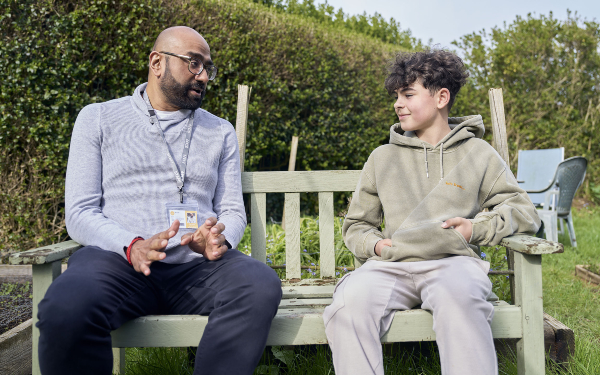
By Anna Glinski, Centre of expertise on child sexual abuse
A few years ago, I was invited to deliver a session at Community Care Live on child sexual abuse.
The session focussed on social work practice across all areas and types of child sexual abuse, but I was struck by the fact that the majority of questions at the end of my presentation related to concerns around sibling sexual behaviour and abuse
During discussion, one social worker said that, in their local authority, they had a blanket policy which stated that siblings should be separated when there was evidence of sexualised behaviour between them. In the case she described, the children were under the age of three.
It was at this moment where the need for clear evidence-based guidance to support social worker’s understanding and decision-making for these children became evident to me.
The risks of blanket policies
In my view, if blanket policies result in siblings younger than three years old being separated, rather than informed assessment and decision making, which recognises the importance of sibling relationships, it is concerning.
This is especially so when we consider that the sibling relationship is probably the longest relationship an individual will have in their lives.
At the Centre of expertise on child sexual abuse, we produce digestible and evidence-based guidance to support practitioners to better identify and respond to sexual abuse of children.
At the time I delivered that session, although there was some academic research into sibling sexual behaviour and abuse available, there was very little information that was easily accessible to support practice.
In 2021 we decided to address this and embarked on a project to combine evidence from research and practice into our first resource in this area: Sibling sexual abuse: A knowledge and practice overview.
Helping social workers work with affected families
Having established key themes and findings from research and practice, we were keen to develop a resource that gives social workers a useful and practical framework for working with children and families affected by sibling sexual behaviour or abuse.
We are delighted to have now published this resource, Sibling sexual behaviour: A summary guide to responding to inappropriate, problematic and abusive behaviour.
More practice guidance from the CSA Centre
 Community Care Inform Children users can benefit from comprehensive guidance on child sexual abuse from the CSA Centre including identifying risk and vulnerability factors, community with children and supporting non-abusing parents. Go to our knowledge and practice hub on CSA to access the guidance.
Community Care Inform Children users can benefit from comprehensive guidance on child sexual abuse from the CSA Centre including identifying risk and vulnerability factors, community with children and supporting non-abusing parents. Go to our knowledge and practice hub on CSA to access the guidance.
This accessible guide supports professionals to negotiate the issues raised by sexual behaviours between siblings. The guide is split into two. Part A covers the identification and understanding of sibling sexual behaviour and part B covers the professional response.
Working with families affected by sibling sexual behaviour and abuse can feel complex – where it is problematic or abusive, social workers need to think not just about the child who has been harmed, but also the child who has harmed.
Families often experience these events as a crisis, so supporting parents and carers is essential.
Assessing whether behaviour is appropriate or abusive
Assessing whether sexual behaviour is developmentally expected, inappropriate/problematic, or abusive can be challenging and, as we know from research (Yates, 2018), it is also mostly subjective.
But this resource is designed to help and we hope this step-by-step guidance will give social workers the confidence that they do already have the skills to respond.
Practitioners need to decide what level of risk the behaviour presents and how best to manage it, whilst holding the welfare of both (or more) siblings in mind.
Guidance on contact and living arrangements
And, crucially, making decisions on living and contact arrangements based on the assessed risk and impact of harm is important. This resource guides social workers through this decision-making process, prompting reflection and review to inform and support them.
It supports social workers to think about providing a response to the whole family, from initial support to assessment and intervention. Concise summaries of the key points alongside useful reflection points are provided throughout.
Thinking back to my own cases and those that I supervised, I truly believe this resource would have helped my team and I make better decisions for these children and their families.
While every case, and every sibling relationship is different (exactly why blanket policies are inadvisable), having a structured guide to guide identification and response decisions will, we hope, be very helpful.
You can download the resource for free here.

Anna Glinski
Anna Glinski is deputy director, knowledge and practice development at the Centre of expertise on child sexual abuse
Reference
Yates, P (2018) ‘Siblings as better together’: Social worker decision making in cases involving sibling sexual behaviour. British Journal of Social Work, 48(1):176–194.




 Family help: one local authority’s experience of the model
Family help: one local authority’s experience of the model  ‘I spent the first three months listening’: how supportive leadership can transform children’s services
‘I spent the first three months listening’: how supportive leadership can transform children’s services  How senior leaders in one authority maintain a culture of excellence
How senior leaders in one authority maintain a culture of excellence  How staff support ensures fantastic outcomes for children and families
How staff support ensures fantastic outcomes for children and families  Workforce Insights – showcasing a selection of the sector’s top recruiters
Workforce Insights – showcasing a selection of the sector’s top recruiters 

 Facebook
Facebook X
X LinkedIn
LinkedIn Instagram
Instagram
It’s very important to be clear about the roles of the parents in education to be aware of what’s going on within the household. Nowadays many parents are too busy with so many things in life such as surviving as to have time to monitor their children. To know how to ask their children the right questions when they notice sexual abuse might be taking place and how to manage this. Also when to seek helps from the authorities. Sexual abuse within the siblings can occur between not just working class children but even professional children who might be too busy to see what’s going on.
Great to bring this into discussions but parents both mum and dad are crucial in addressing this.
Doesn’t really explore the how ‘Sibling sexual behaviour is appropriate’ but okay. Not that it’s acceptable to talk about